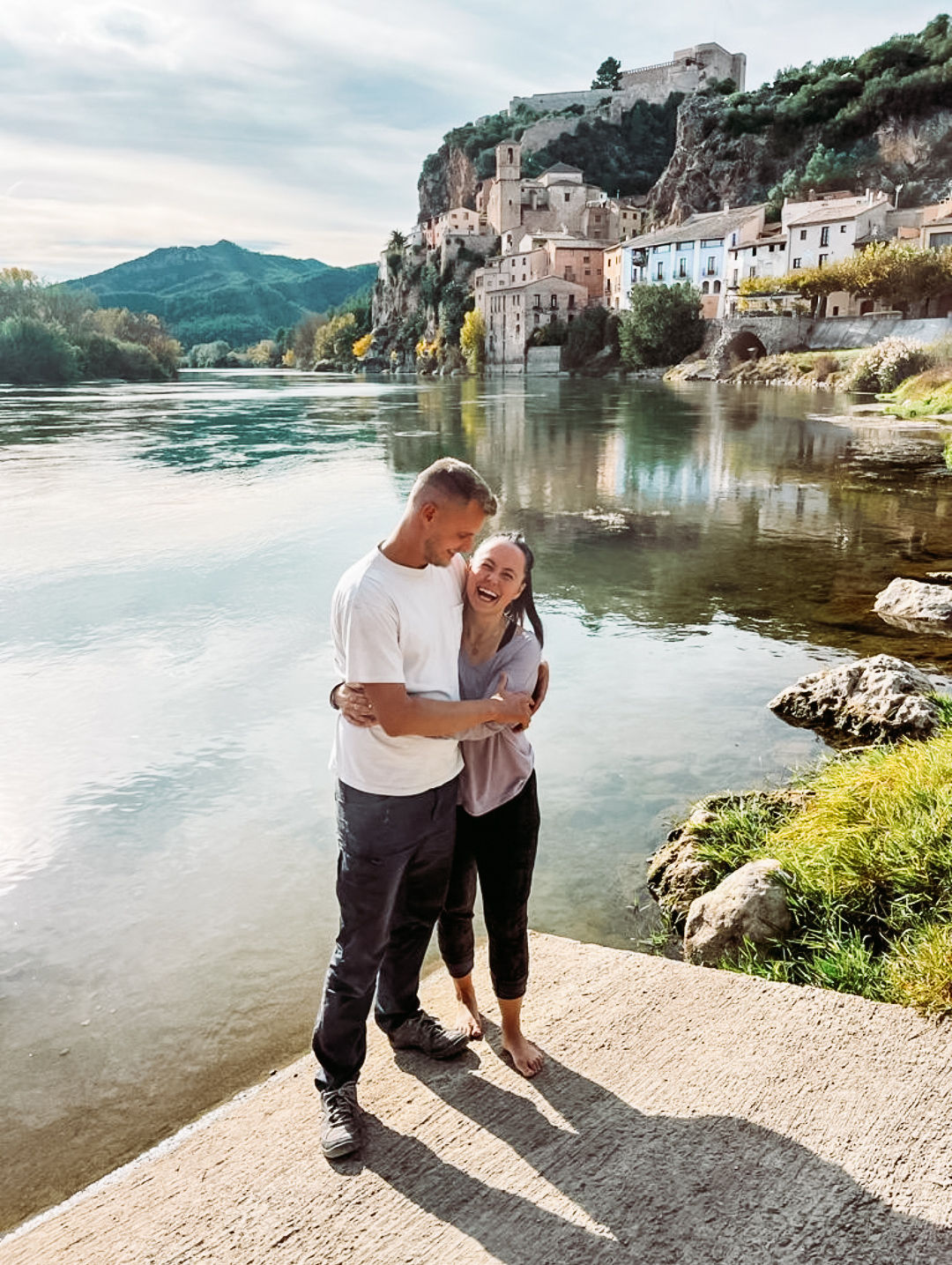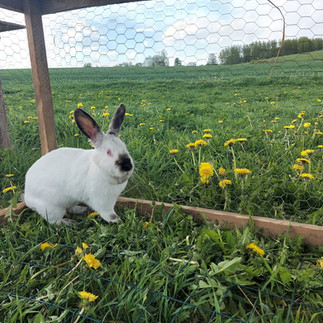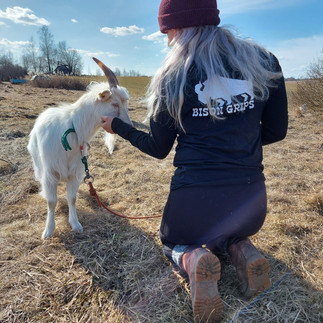My Semi Off-Grid Life In Lithuania Isn’t Perfect,But It’s Mine, Cat Gavriusova
- Georgia Kitson
- Aug 7
- 5 min read
I feel like when people hear the phrase “off-grid”, everyone has their own idea of what that may look like. For some people, it’s a fully renovated or even newly built property with solar panels, a fancy water supply, maybe a plot of woodland to provide firewood.
Someone else would see a signature Spanish finca, light-coloured stone walls, a rainwater cistern, a glove of old almond trees.

In Lithuania, most off-grid and semi-off grid living doesn’t look like either of the above options. I live on a small homestead in rural Lithuania, on a very low budget, with electricity but no running water, gas, or phone lines. I share the land with animals, wild seasons, and a sense of freedom that’s hard to come by elsewhere. Scrolling through my socials, it may seem idyllic but it’s not a romantic back-to-the-land fantasy. It’s real, and it’s mine.
Why I Chose This Homestead Life In Lithuania
I didn’t grow up dreaming of chopping firewood or hauling buckets of water in sub-zero winters. Funnily enough, I had spent my entire life as an urbanite, progressively moving to larger and larger cities. Maybe I did not know any better, maybe this was my youthful ambition to make friends and earn a living.
Don’t get me wrong, I don’t want to denounce my years in Vilnius or Birmingham. I met amazing people, I learned a lot; living in the city shaped me as a person throughout adolescence and adulthood. And I would be lying if I said there was a sudden shift or a “calling” to leave it all behind.
Slowly but surely, I leaned into my hippie side. I always loved the outdoors - as a kid, I spent summers camping, foraging, canoeing and swimming. As an adult, I rediscovered these passions, and picked up hobbies like yoga and growing vegetables.
Gradually, city life started to feel too busy, too noisy. Not to mention, it was not getting any cheaper, and I found myself in a vicious cycle of working progressively more just to stay afloat, leaving no time for nature walks or enjoyment in general.
For many people, COVID lockdowns were a wake-up call in regards to their jobs, relationships, and lifestyle. For me and my husband, spending weeks in a one-bedroom flat in Handsworth Wood was a breaking point that led to our move to Lithuania.
My mum, who lives in Lithuania (albeit in the city), was incredibly sceptical. Despite the fact that she was the one who instilled the love for the outdoors in me, she couldn’t envision me as a homesteader, living in a crooked old cottage without running water or a grocery store nearby. I guess I proved her wrong!
Semi Off-Grid: My Set Up In Lithuania
When looking through properties, we did not solely search for an off-grid home. Truth be told, most old homesteads in Lithuania are semi or fully off-grid as a remnant of the times when getting a water or electricity supply in the countryside was out of the question.
My home has electricity, but no plumbing, gas, or central heating. We deconstructed an old brick furnace in favour of a cast iron woodburner, built a composting toilet, and slowly started restoration of the home, inside and out. I collect rainwater, haul buckets of water from the pond, and fill up on drinking water in a nearby town. It’s not glamorous, but it works, and it's sustainable, both financially and environmentally - at least compared to city living.
While I do rely on the local stores, I am also growing food in the vegetable garden in the summer season and forage when possible. Our sheep help with land management, guinea fowl eat ticks and mosquitoes, chickens hatch more guinea fowls, and goats… Well, I guess the goats are also there.

The Legal Bits: Buying A Homestead In Lithuania
Most common questions I get are about the legalities of purchasing an off-grid property (home or land), and taking permanent residence somewhere like that.
I’m not going to pretend I’m an expert because I essentially only know what is legal regarding my exact situation. But I will say that zoning laws and building regulations are generally much more relaxed in Lithuania compared to other places (with the exception of properties in the National Park territories). In practice, the farther you are from the city, the more lenient and negotiable these things can become.
My homestead is on land classified for residential use, which means I can legally live here all year and have it down as my permanent address. Planning permission is required for most structural changes or new builds. You may also need to apply to change classification if it is registered as agricultural land.
Buying the property was also very easy but this is largely due to the fact that I am a Lithuanian citizen. All it took is a visit to a notary who validated and registered the sale. Laugh all you want, but we literally paid in cash - no need for solicitors or bank approval. Of course, that is also because we bought one of the cheapest properties on the market.
Making a Living Remotely In Lithuania
Finances are a huge roadblock for anyone who wants to make a move to a remote location like we did. Whether it’s the lack of funds/credit to buy a property, or the lack of job prospects to sustain this lifestyle, it is fair to say that it is a challenge.
I will readily admit that I am incredibly lucky and privileged to be able to enjoy this lifestyle. My skills lend themselves naturally to various types of remote work: content and copywriting, photography, translation, and teaching yoga online. Occasionally, one opportunity leads to another, and I get to expand my skillset and “employability”.
This is not going to be the case for everyone. While there are more opportunities than ever for online work, remote work is not accessible for someone whose profession is hands-on (medical field, construction, mechanics and engineers, etc.), especially considering the language barrier.
Living in the middle of nowhere means fewer job opportunities but also fewer expenses. Living rurally also encourages me to be creative and mindful of my consumption: when you’re the one growing your food, carrying firewood or buckets of water, you’re not so flippant about using your hard-earned resources.
Main Challenges Living Off Grid In Lithuania (and why it’s still worth it)
In case I wasn’t clear, this lifestyle is not easy by any means. Caring for animals, managing land, repairing an old house and sub-zero winters are no joke. Working on a tight budget often means jobs around the property have to be prioritised or completed in stages. Not having a car or a driver’s licence is not an option. Living on a homestead can get very isolating, especially when you don’t speak the same language as everyone else. Legal processes take time and patience (and sometimes, more money).
And yet, here I am. I’m not just surviving, I’m building something real, something mine. There’s satisfaction in learning how to fix things, in waking up to quiet snow, in seeing what you can do with what you’ve got.
Turns out, I love this quiet life, for all the lack of convenience, the cold winters, the grass that never stops growing, the birdsong that is ever present in the summer, the roe deer and moose that roam around here, the heavy buckets of water, and my crooked old house.
I don’t have a perfect life. But I have autonomy, a growing connection to the land, and the peace that comes with choosing my own version of “enough.”
Website: bendandascend.com
Socials: (Insta, Facebook): @bendandascend
Newsletter: http://eepurl.com/iSWbSQ
Usually has pose of the month, themed blog post, yoga video, and a PDF freebie
To book classes, buy digital content or support me: https://buymeacoffee.com/bendandascend
Cat x































Comments